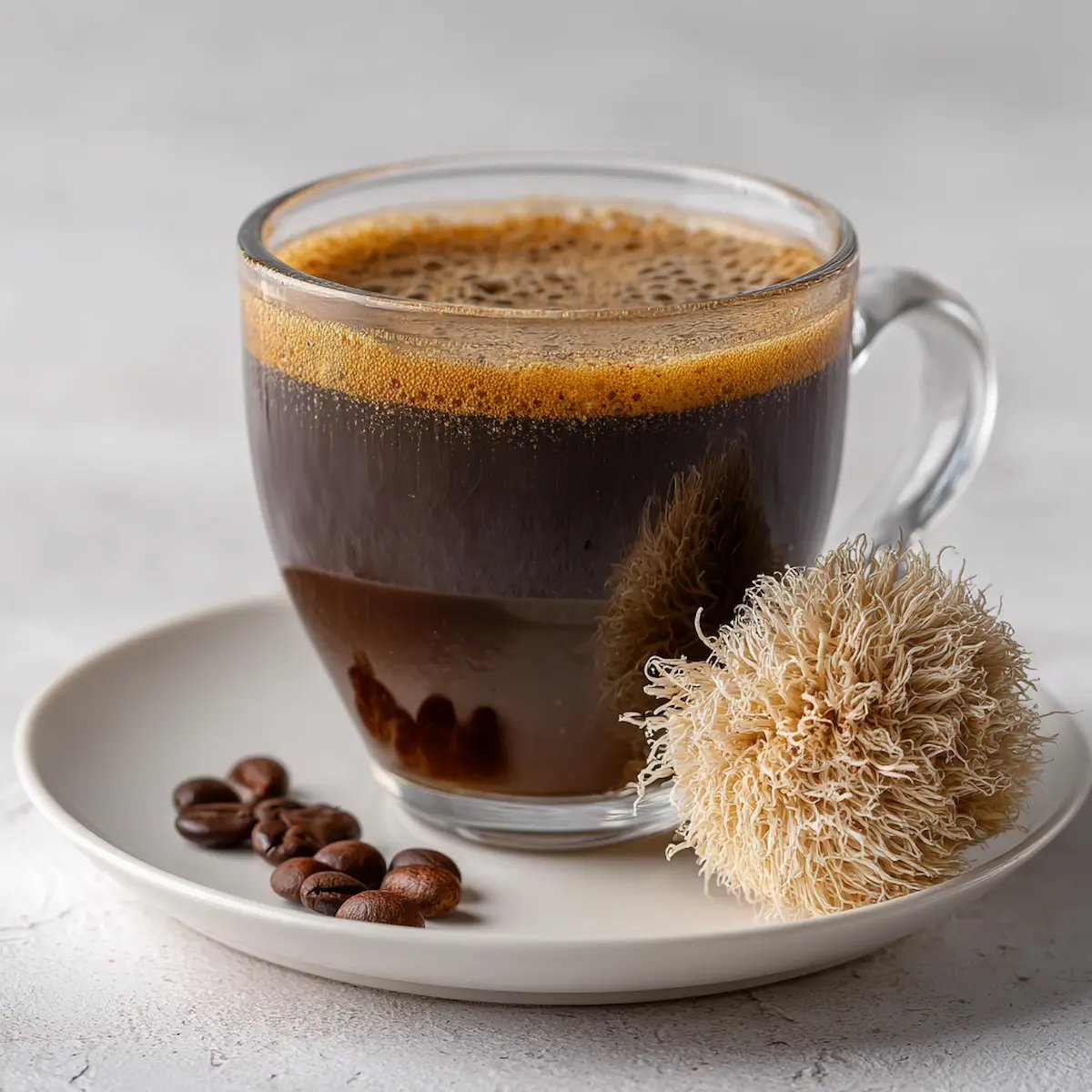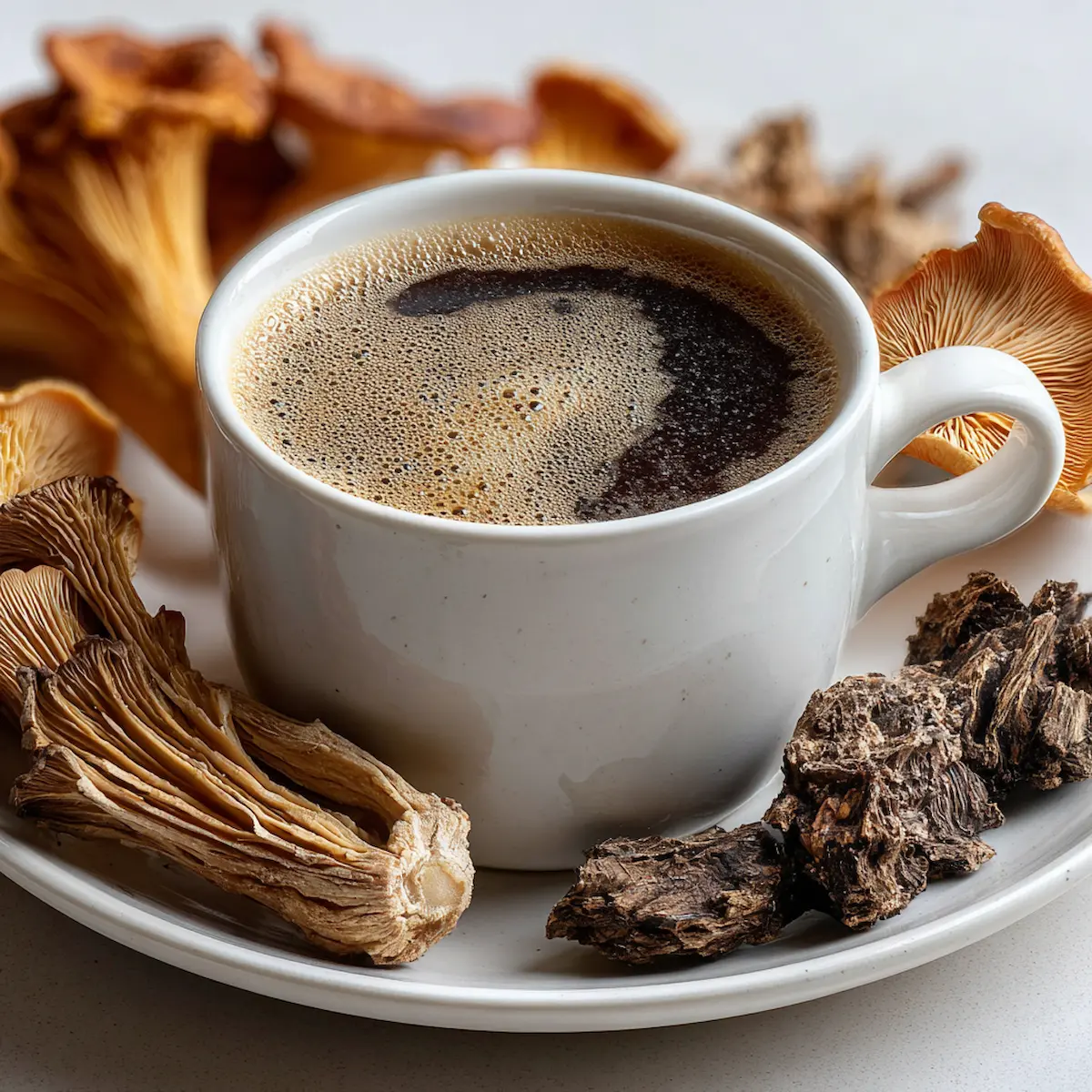Mushroom Coffee Benefits: Real Perks or Just Buzz?
If you’ve been seeing mushroom coffee popping up in your local grocery store or all over your Instagram feed, you’re not alone. This earthy-sounding brew is part of a growing wellness trend — blending traditional coffee with powdered medicinal mushrooms like Lion’s Mane, Reishi, and Chaga. And no, it doesn’t taste like a sautéed portobello — it’s more like your usual cup of joe, just with a nutritional twist.
So why are people making the switch? It’s not just about cutting caffeine. Many are looking for “functional” beverages — drinks that offer more than flavor or a caffeine buzz. From stress support to immune balance, mushroom coffee promises a lot.
But do these claims actually hold up? In this post, we’ll look at the science (not the hype) behind mushroom coffee benefits — and whether it might be a smart sip for your health goals.
👉 Want to brew your own? Don’t miss our Ultimate Mushroom Coffee Recipe Post.
Note: This article is for educational purposes only and isn’t medical advice. Please speak with your healthcare provider before making any changes to your routine, especially if you’re pregnant, nursing, or managing health conditions.
The “Magic” Behind the Mushrooms: Understanding Adaptogens & Key Compounds
Adaptogens: Nature’s Built-In Stress Helpers
Before we get into mushroom coffee benefits, let’s talk about a key idea behind it: adaptogens.
Adaptogens are naturally occurring compounds (often found in herbs and fungi) that may help the body deal with physical and mental stress. The idea is simple: instead of pushing your body in one direction, adaptogens help bring it back to balance — like a thermostat adjusting to keep things just right.
How? Researchers believe adaptogens may influence the HPA axis (that’s your hypothalamic-pituitary-adrenal system — the body’s main stress response network). By gently interacting with this system, adaptogens might help smooth out our reaction to stress, whether it’s mental, emotional, or physical.
Medicinal mushrooms like Reishi, Cordyceps, and Lion’s Mane are considered adaptogenic mushrooms, and that’s a big part of why they’ve become popular in functional beverages like mushroom coffee.
👉 Source: Cleveland Clinic – What Are Adaptogens?
Beyond Adaptogens: The Real Power is in the Compounds
Medicinal mushrooms don’t just stop at stress support. They’re loaded with bioactive compounds — fancy science speak for natural substances that may impact health in various ways.
Here are some key ones to know:
- Beta-glucans: These are a type of polysaccharide known for their role in immune system modulation. You’ll find them in many mushrooms, especially Reishi and Chaga.
- Triterpenes: Found in Reishi, these are linked to anti-inflammatory and antioxidant effects.
- Antioxidants: Chaga is particularly rich in these, helping to fight oxidative stress caused by free radicals.
- Hericenones and Erinacines: These unique compounds are found in Lion’s Mane and may stimulate nerve growth factor (NGF) — important for brain and nerve health.
Each mushroom has its own special mix of these ingredients, which we’ll explore in the next section.
Lion’s Mane (Hericium erinaceus): The Brain-Boosting Fungus

Support for Focus, Memory, and Mental Clarity
If mushroom coffee had a “brainy” best friend, it’d be Lion’s Mane. This shaggy white mushroom is well-known in traditional Eastern medicine — and now, modern science is starting to catch up.
The most talked-about benefit? Cognitive support. Early studies suggest Lion’s Mane may help with memory, focus, and overall brain function. That’s thanks to two rare compounds it contains: hericenones and erinacines. These may stimulate the production of nerve growth factor (NGF) — a key protein involved in the health and survival of neurons.
In a small 2009 clinical trial, older adults with mild cognitive impairment took Lion’s Mane extract daily and showed significant improvement in cognitive function compared to the placebo group. While more research is definitely needed (especially in younger adults and larger populations), this study got people talking — and sipping.
👉 Sources:
- Mori et al., 2009 – Double-blind clinical trial on Lion’s Mane & cognition
- Spelman et al., 2017 – Review on Lion’s Mane neurological activity
Mood & Nerve Support
Beyond the brain boost, Lion’s Mane may have a mood-balancing side. A small 2010 study found that women who ate Lion’s Mane-laced cookies for four weeks reported reduced symptoms of anxiety and depression.
Some researchers also believe Lion’s Mane could support nerve regeneration, based on promising (but early) animal and lab studies. While this sounds exciting, human research is still very limited here — so consider this more of a potential, not a promise.
👉 Source:
Nagano et al., 2010 – Lion’s Mane & anxiety/depression symptoms
Keywords: lion’s mane for mood, nerve regeneration
Lion’s Mane: Things to Know Before You Brew
Lion’s Mane is generally well-tolerated, but no mushroom is one-size-fits-all. Rare allergic reactions can happen, especially for those with mold or mushroom sensitivities.
Also, because of its potential effects on nerve function and circulation, check with your doctor if you’re on blood-thinning medications or have bleeding disorders.
👉 Curious to try it? See our Lion’s Mane Coffee Recipe.
Reishi (Ganoderma lucidum): The Mushroom of Calm & Immunity

Stress Relief and Sleep Support
If Lion’s Mane is the go-to for brain health, Reishi is like your herbal therapist. Known as the “mushroom of immortality” in traditional Chinese medicine, Reishi has been used for centuries to help calm the mind and support sleep — and modern research is starting to explain why.
Reishi contains compounds that may help modulate neurotransmitters and influence stress hormones. That’s science-speak for: it might help your body chill out. It’s considered an adaptogen, which means it could help your system respond more gracefully to stress.
Some animal studies show Reishi extract can enhance sleep — possibly by working with the GABA system in the brain, the same one affected by calming herbs like valerian or chamomile. While we’re still short on large human studies for sleep, plenty of users report feeling more relaxed after adding Reishi to their coffee routine.
👉 Sources:
- Wachtel-Galor et al., 2011 – Ganoderma lucidum: A Medicinal Mushroom
- Cui et al., 2012 – Reishi extract enhances sleep in animal study
Keywords: reishi benefits, stress relief, calming adaptogen, sleep support, anxiety reduction
Immune Modulation: Not Just Boosting — Balancing
Reishi is also packed with beta-glucans, which can influence the immune system — helping to either activate or calm it, depending on what your body needs. That’s why it’s often described as an immune modulator, rather than just a booster.
One study review points to Reishi’s anti-inflammatory and immunomodulatory properties, particularly in helping regulate cytokine activity (the messengers of the immune system). This may be helpful for overall wellness and resilience, especially when combined with a balanced diet and lifestyle.
👉 Source:
Anti-inflammatory and Immunomodulating Properties of Ganoderma lucidum
Keywords: reishi for immunity, immune modulation, beta-glucans
Caution: Is Reishi Right for You?
While Reishi is often praised for its calming nature, it’s not without cautions.
Some people experience digestive upset or dizziness when starting out. Reishi may also lower blood pressure, which can be helpful — or problematic if you already deal with low blood pressure.
Because of its mild blood-thinning effects, those on anticoagulants or with upcoming surgeries should talk to a doctor first.
👉 Want to unwind naturally? Try our Reishi Mushroom Coffee Recipe.
Chaga (Inonotus obliquus): The Antioxidant Powerhouse

Fighting Oxidative Stress with Antioxidants
Chaga may not look like much — it kind of resembles burnt wood growing on birch trees — but inside, it’s packed with antioxidants. If your goal is to reduce oxidative stress (that internal wear-and-tear caused by free radicals), Chaga is worth knowing.
In fact, it’s one of the highest-antioxidant mushrooms known, and often tops herbal antioxidant charts. While the ORAC score (a measure of antioxidant potential) is sometimes debated in scientific circles, Chaga consistently shows promise in lab studies for neutralizing oxidative damage — the kind that can contribute to aging and chronic diseases over time.
One 2022 review noted its high antioxidant content and protective effects against cellular stress, calling it a mushroom with “numerous health benefits” — though most of the studies so far have been in cells or animals, not humans.
👉 Source:
2022 – Chaga mushroom health benefits review
Keywords: chaga benefits, antioxidant rich, oxidative stress, free radicals
Immune Support and Inflammation Balance
Chaga isn’t just about antioxidants — it also has potential immune-modulating and anti-inflammatory properties. Like Reishi, it contains beta-glucans, which can gently support your immune system without overstimulating it.
Some lab studies show Chaga may help reduce inflammatory markers, and even promote the production of immune-supportive cytokines. However, most of these findings come from test-tube or animal studies, so while the results are promising, they’re not conclusive for everyday coffee drinkers just yet.
👉 Resource:
MSKCC – Chaga Mushroom (Integrative Medicine Guide)
Keywords: chaga for immunity, anti-inflammatory mushrooms
Cautions: Why Chaga Isn’t for Everyone
Chaga is very high in oxalates, which are natural compounds that — in excess — can contribute to kidney stone formation. If you’ve had stones before or are at risk, talk with your healthcare provider before sipping Chaga daily.
It also may affect blood sugar levels (potentially lowering them) and could interact with blood-thinning medications. As with all medicinal mushrooms, personalized medical advice is best.
👉 Curious about adding this antioxidant booster to your cup? Try our Chaga Mushroom Coffee Recipe.
Cordyceps (Cordyceps sinensis / militaris): The Energy & Endurance Enhancer

Natural Energy and Stamina Support
If Reishi is the mushroom of calm, Cordyceps is its energized cousin. Long used in traditional Chinese medicine to support energy, stamina, and performance, it’s gained modern popularity among athletes and coffee drinkers who want to stay alert — without the crash.
So how does it work? Cordyceps may support oxygen utilization and help the body produce ATP (adenosine triphosphate) — that’s the primary fuel source for our cells. Better ATP production = more efficient energy at a cellular level.
A small human study found that Cordyceps militaris supplementation helped improve tolerance to high-intensity exercise, both with short- and long-term use. While it’s not a magic pre-workout, it may give your morning brew a helpful edge.
👉 Source:
Hirsch et al., 2017 – Cordyceps militaris and exercise performance
Traditional Use for Libido & Respiratory Health
Historically, Cordyceps was used as a tonic for vitality, including libido and respiratory health. While the libido claims haven’t been studied extensively in modern trials, traditional practitioners have used Cordyceps to support sexual health and lung function for centuries.
Some early research supports its potential role in improving respiratory endurance and oxygen flow, which may be part of its appeal for both athletes and people recovering from illness — but again, more high-quality human studies are needed here.
👉 Resource:
Examine.com – Cordyceps Overview
Is Cordyceps Safe for Everyone?
In general, Cordyceps is considered safe for most people, especially when consumed as part of a mushroom coffee blend. But there are a few notes of caution.
Because it can stimulate the immune system, anyone with an autoimmune condition or on immunosuppressive medications should check with a healthcare provider first. It may also interact with blood sugar or blood pressure medications, though those effects tend to be mild in most cases.
👉 Looking for a natural energy boost? Don’t miss our Cordyceps Coffee Recipe.
Beyond Individual Mushrooms: Benefits of the Mushroom Coffee Blend
1. Potentially Lower Caffeine Intake (Without Losing the Ritual)
One of the first things people notice when switching to mushroom coffee? Fewer jitters. That’s because most mushroom coffee blends contain less caffeine than a regular cup of coffee.
By replacing a portion of the ground coffee with mushroom extracts, many brands naturally lower the caffeine content — often cutting it in half or more. The result? A gentler buzz that’s less likely to lead to energy crashes, heart palpitations, or sleep disruption.
For caffeine-sensitive folks (like me after 2 p.m.), this can make a huge difference. You still get that cozy, warm mug and morning ritual — just without the rollercoaster.
👉 Source: Mayo Clinic – Caffeine content for coffee, tea, soda and more
2. A Nutritional Bonus
Mushrooms don’t just bring functional benefits — they offer a touch of extra nutrition, too.
While mushroom coffee shouldn’t be your main source of vitamins and minerals, many blends include antioxidants, trace minerals (like selenium and copper), and bioactive compounds that plain coffee doesn’t. Plus, when you’re sipping mushrooms like Chaga or Reishi, you’re getting those immune-supporting beta-glucans in every cup.
3. Sustained Energy (That’s Not Just in Your Head)
Many users — myself included — describe the energy from mushroom coffee as feeling more steady and calm. You get alertness, but without the spikes and crashes that sometimes follow high-caffeine drinks.
While this isn’t fully backed by large-scale studies yet, the combo of adaptogens and reduced caffeine may help regulate energy more evenly. That could mean less afternoon fog or a more peaceful wind-down at night.
Not a Magic Potion: What to Consider Before Sipping
1. Quality & Sourcing Matter More Than You Think
Not all mushroom coffees are created equal.
Some blends use high-quality extracts from the fruiting body of the mushroom — that’s the part traditionally used in herbal medicine. Others use mycelium grown on grain, which can be cheaper but less potent. The difference? Fruiting bodies tend to have higher concentrations of the key bioactive compounds we’ve been talking about.
Here’s what to look for on labels:
- Organic ingredients
- Clearly labeled fruiting body extracts
- Hot water or dual extraction methods (best for potency)
- Third-party testing for heavy metals, molds, and pesticides
If a brand doesn’t tell you how their mushrooms are sourced or extracted? That’s a red flag.
2. Possible Side Effects: What You Might Notice
Most people tolerate mushroom coffee well, but mild side effects can happen — especially when you’re first introducing new ingredients to your system.
Some common ones include:
- Digestive upset (especially if your gut is sensitive)
- Dizziness or a light-headed feeling
- Allergic reactions (rare, but possible — especially if you have mold or mushroom allergies)
Start with a small amount and pay attention to how your body responds.
Keywords: mushroom coffee side effects, allergic to mushroom coffee, digestive issues
3. Drug Interactions: Take This Seriously
This is the part where we take off the cozy sweater and put on our “better safe than sorry” hat.
Medicinal mushrooms can interact with medications. Some, like Reishi or Chaga, may thin the blood or lower blood pressure. Others, like Cordyceps, may affect immune function or blood sugar.
Here’s the bottom line:
If you take any prescription medications, especially for blood pressure, diabetes, clotting disorders, or immune suppression — talk to your doctor first.
👉 Source: FDA – Tips for Dietary Supplement Users
Keywords: mushroom coffee drug interactions, medication interactions
4. Who Should Probably Skip It (or Be Extra Cautious)
Mushroom coffee might not be the best fit for everyone. You should definitely check with a healthcare provider first if you:
- Are pregnant or breastfeeding (not enough research yet)
- Have a mushroom allergy
- Live with an autoimmune disorder
- Take blood thinners, insulin, or immunosuppressants
- Have a bleeding disorder or upcoming surgery
- Are buying it for children (there’s very little data for kids)
5. Let’s Talk About Cost
One last thing — mushroom coffee can get pretty pricey, especially if you’re buying individual servings or brand-name blends.
If you’re watching your grocery budget (like we are), consider making your own mix at home using organic mushroom powders and your favorite coffee beans.
👉 Learn how in our [DIY Mushroom Coffee Blend Recipe].
Is Mushroom Coffee Right for You? Making an Informed Choice
A Promising Sip — With Perspective
There’s no denying that mushroom coffee is having a moment. And while some of the buzz is overblown, the science behind certain mushrooms — like Lion’s Mane, Reishi, Chaga, and Cordyceps — is genuinely intriguing.
These functional fungi aren’t just trendy. They’ve been studied for their potential to support focus, immunity, energy, stress balance, and antioxidant defense — all things many of us could use help with. But let’s be clear: mushroom coffee isn’t a miracle cure. It works best as one piece in a bigger wellness picture that includes good food, sleep, movement, and stress care.
Keywords: mushroom coffee benefits, functional mushrooms, adaptogenic coffee
Listen to Your Body (and Your Doctor)
If you’re curious to try mushroom coffee, start slow. Try one mushroom at a time if you can — or start with a half-serving of a blend. Pay attention to how your body feels, and stop if anything seems off.
And if you have existing health conditions or take medications? Always loop in your doctor first. Mushroom coffee may be natural, but “natural” doesn’t mean risk-free.
It’s More Than Coffee — It’s a Lifestyle Choice
Choosing mushroom coffee isn’t just about what’s in your mug. It’s about making space for rituals that support your body and mind in a more intentional, gentle way. That’s why so many people (myself included) keep reaching for it, day after day.
Final word about mushroom coffee benefits : If it works for your body, budget, and life? Great. If not, that’s okay too. Your health journey is your own — and this cup is just one possible companion along the way.
👉 Want to give it a try? Browse our Ultimate Mushroom Coffee Recipe Post for ideas, blends, and cozy tips.
Disclaimer: This article is for informational purposes about only and should not be considered medical advice. Always consult a qualified healthcare provider before making changes to your supplement or wellness routine.

